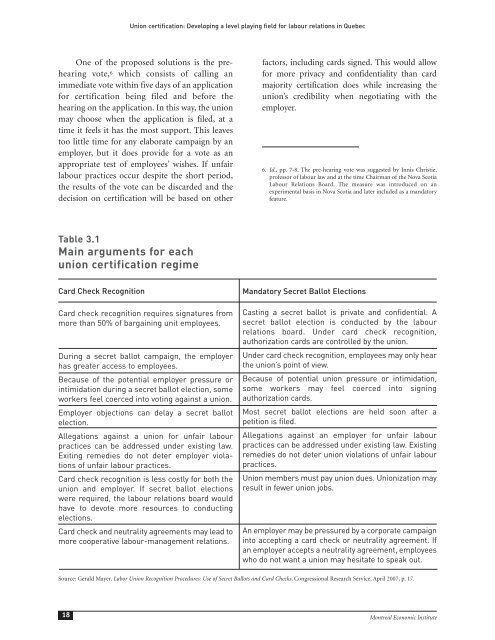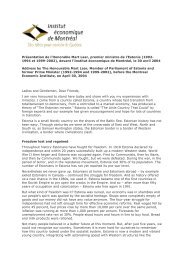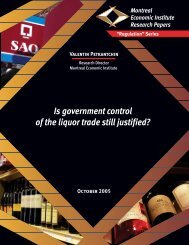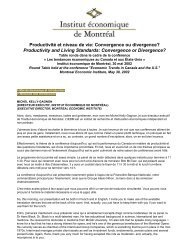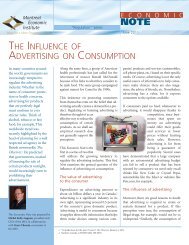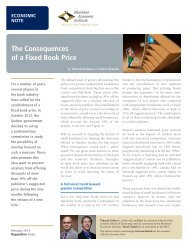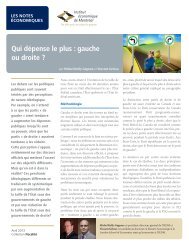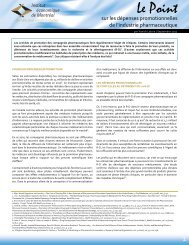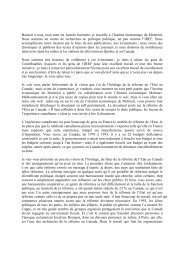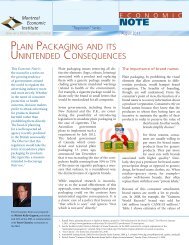Union certification: Developing a level playing field ... - LabourWatch
Union certification: Developing a level playing field ... - LabourWatch
Union certification: Developing a level playing field ... - LabourWatch
Create successful ePaper yourself
Turn your PDF publications into a flip-book with our unique Google optimized e-Paper software.
<strong>Union</strong> <strong>certification</strong>: <strong>Developing</strong> a <strong>level</strong> <strong>playing</strong> <strong>field</strong> for labour relations in QuebecOne of the proposed solutions is the prehearingvote, 6 which consists of calling animmediate vote within five days of an applicationfor <strong>certification</strong> being filed and before thehearing on the application. In this way, the unionmay choose when the application is filed, at atime it feels it has the most support. This leavestoo little time for any elaborate campaign by anemployer, but it does provide for a vote as anappropriate test of employees’ wishes. If unfairlabour practices occur despite the short period,the results of the vote can be discarded and thedecision on <strong>certification</strong> will be based on otherfactors, including cards signed. This would allowfor more privacy and confidentiality than cardmajority <strong>certification</strong> does while increasing theunion’s credibility when negotiating with theemployer.6. Id., pp. 7-8. The pre-hearing vote was suggested by Innis Christie,professor of labour law and at the time Chairman of the Nova ScotiaLabour Relations Board. The measure was introduced on anexperimental basis in Nova Scotia and later included as a mandatoryfeature.Table 3.1Main arguments for eachunion <strong>certification</strong> regimeCard Check RecognitionCard check recognition requires signatures frommore than 50% of bargaining unit employees.During a secret ballot campaign, the employerhas greater access to employees.Because of the potential employer pressure orintimidation during a secret ballot election, someworkers feel coerced into voting against a union.Employer objections can delay a secret ballotelection.Allegations against a union for unfair labourpractices can be addressed under existing law.Exiting remedies do not deter employer violationsof unfair labour practices.Card check recognition is less costly for both theunion and employer. If secret ballot electionswere required, the labour relations board wouldhave to devote more resources to conductingelections.Card check and neutrality agreements may lead tomore cooperative labour-management relations.Mandatory Secret Ballot ElectionsCasting a secret ballot is private and confidential. Asecret ballot election is conducted by the labourrelations board. Under card check recognition,authorization cards are controlled by the union.Under card check recognition, employees may only hearthe union’s point of view.Because of potential union pressure or intimidation,some workers may feel coerced into signingauthorization cards.Most secret ballot elections are held soon after apetition is filed.Allegations against an employer for unfair labourpractices can be addressed under existing law. Existingremedies do not deter union violations of unfair labourpractices.<strong>Union</strong> members must pay union dues. <strong>Union</strong>ization mayresult in fewer union jobs.An employer may be pressured by a corporate campaigninto accepting a card check or neutrality agreement. Ifan employer accepts a neutrality agreement, employeeswho do not want a union may hesitate to speak out.Source: Gerald Mayer, Labor <strong>Union</strong> Recognition Procedures: Use of Secret Ballots and Card Checks, Congressional Research Service, April 2007, p. 17.18 Montreal Economic Institute


